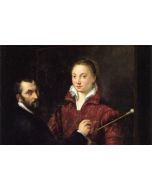Friday lates: art and maps
This course will be delivered online. See the ‘What is the course about?’ section in course details for more information.

Sorry, this course is now full
- Course Code: VB175
- Dates: 26/04/24 - 26/04/24
- Time: 18:00 - 20:00
- Taught: Fri, Evening
- Duration: 1 session
- Location: Online
- Tutor: Christopher Collier
Course Code: VB175
Duration: 1 session
Please note: We offer a wide variety of financial support to make courses affordable. Just visit our online Help Centre for more information on a range of topics including fees, online learning and FAQs.
What is the course about?
From early 20th century Surrealist collages, to the “psycho-geography” of the 1950s, right through to the GPS technology of today, artists have had a love affair with maps. Whether as abstract patterns, as tools to explore spatial experience, or as ways to examine how society is structured, artists have used cartography to produce a wide range of works. This course examines art from across the 20th Century, including Fluxus, Land Art and contemporary Digital Media practices. We encounter artists who’ve worked with maps to explore identity, mobility and to uncover deeper social and political issues.
The course is structured around a lecture format with some brief class discussion exploring relevant concepts and historical questions.
This is a live online course. You will need:
- Internet connection. The classes work best with Chrome.
- A computer with microphone and camera is best (e.g. a PC/laptop/iMac/MacBook), or a tablet/iPad/smart phone/iPhone if you don't have a computer.
- Earphones/headphones/speakers.
We will contact you with joining instructions before your course starts.
What will we cover?
• Rethinking maps and mapping with Surrealism and the Situationist “psychogeography”.
• Maps in Fluxus and Land Art: from Yoko Ono and Daniel Spoerri to Agnes Dene and Hamish Fulton.
• Contemporary Digital Media artists who use GPS and mobile mapping technology in their practice.
What will I achieve?
By the end of this course you should be able to...
• List at least three art movements who have used mapping as an important part of their practice.
• Identify three ways in which artists have used maps to question conventional modes of representation.
• Analyse key works and participate in discussions about them.
What level is the course and do I need any particular skills?
This course is suitable for all levels.
You should be able to follow simple written and verbal instructions, demonstrations, hand-outs and health and safety information as well as basic functions of Zoom, specifically microphone and camera.
How will I be taught, and will there be any work outside the class?
You will be taught online with slide presentations and group discussions.
Are there any other costs? Is there anything I need to bring?
You might wish to buy a notebook. You might wish to buy some of the books mentioned in class.
When I've finished, what course can I do next?
Search our website for 'Friday Lates' to see a range of short courses on a variety of art historical topics.
You might also be interested in:
Friday Lates: Psychogeography: The Art of Getting Lost
Friday Lates: Poster Art: Print, Pop and Propaganda.
Christopher Collier trained as an artist, before gaining an MA in Cultural Studies at Goldsmiths and a PhD in Art History and Theory from the University of Essex. He has taught at institutions including the University of Essex, Cambridge School of Art, and Winchester School of Art, as well as presenting internationally at a range of workshops and conferences, including at the ICA, London and CCA, Glasgow. His broad range of interests includes the intersections of art and the more-than-human world, along with art's relations to wider political economy and cultural theory. He is an Associate Fellow of the Higher Education Academy.
Please note: We reserve the right to change our tutors from those advertised. This happens rarely, but if it does, we are unable to refund fees due to this. Our tutors may have different teaching styles; however we guarantee a consistent quality of teaching in all our courses.
